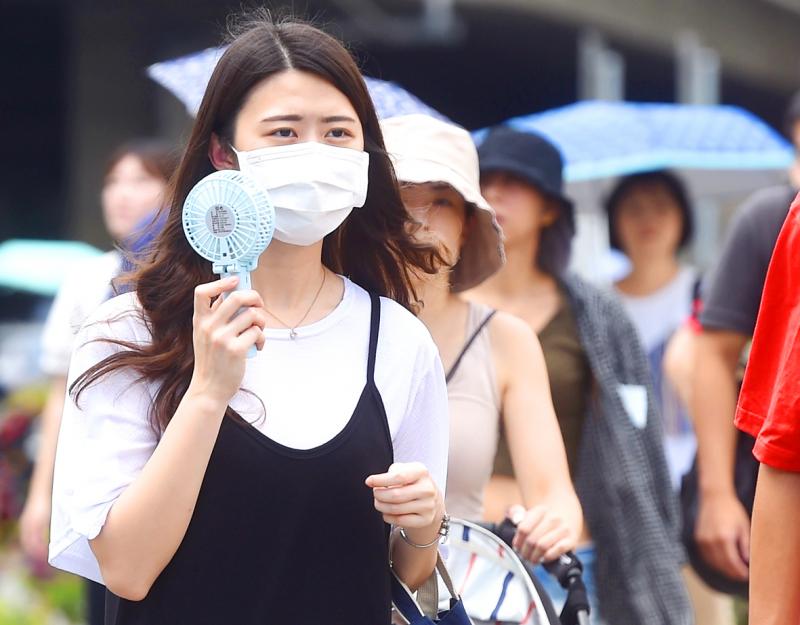The number of people seeking medical treatment for heat injury last month rose 40 percent to 653 from 467 a year earlier, the Health Promotion Administration (HPA) said yesterday.
Heat injuries include heatstroke, heat syncope, heat cramps, heat exhaustion, thermal fatigue and heat edema, it said.
HPA Community Health Division head Lo Su-ying (羅素英) said that people should drink water regularly when they are in warm environments, regardless of whether they are engaged in sports or other intense activities.

Photo: Chien Jung-fong, Taipei Times
They should not wait until they are thirsty to drink water, she said, adding that decreased urine output and darker urine color are signs of inadequate fluid intake.
People should also avoid drinking alcoholic beverages, Lo said.
People who work outdoors should monitor weather updates, she said, adding that they should avoid working at high noon.
Their work environment should be equipped with ventilators and shades, she said, adding that employers should arrange for workers to work in shifts when the weather is hot.
“Workers should wear light-colored, easy-fitting clothes made of breathable materials. They should wear sun-blocking and ventilating hats as well as sunglasses, and avoid direct exposure to the sun or hot stoves for long periods,” Lo said.
People with chronic diseases and elderly people should undergo health exams to see if they can work in environments with high temperature and humidity, Lo said.
They should also watch their use of medication, as taking diuretics, for example, would accelerate dehydration, she said.
“If they show signs of a heat injury, such as increased body temperature, dry and red skin, rapid heartbeat, headache, nausea, vomiting, delirium or cramps, they should immediately leave the high-temperature work environment and try to cool down by loosening their clothes and wiping their body with wet towels, Lo said.
“They should also drink slightly salted water or sports drinks. If there is still no sign of improvement, they should seek medical attention as soon as possible,” she said.
HPA Director-General Wang Ying-wei (王英偉) said that employers can consult the heat-injury prevention Web site built by the Occupational Safety and Health Administration under the Ministry of Labor to check the level of heat injury risk in their area.

AGING: As of last month, people aged 65 or older accounted for 20.06 percent of the total population and the number of couples who got married fell by 18,685 from 2024 Taiwan has surpassed South Korea as the country least willing to have children, with an annual crude birthrate of 4.62 per 1,000 people, Ministry of the Interior data showed yesterday. The nation was previously ranked the second-lowest country in terms of total fertility rate, or the average number of children a woman has in her lifetime. However, South Korea’s fertility rate began to recover from 2023, with total fertility rate rising from 0.72 and estimated to reach 0.82 to 0.85 by last year, and the crude birthrate projected at 6.7 per 1,000 people. Japan’s crude birthrate was projected to fall below six,

Conflict with Taiwan could leave China with “massive economic disruption, catastrophic military losses, significant social unrest, and devastating sanctions,” a US think tank said in a report released on Monday. The German Marshall Fund released a report titled If China Attacks Taiwan: The Consequences for China of “Minor Conflict” and “Major War” Scenarios. The report details the “massive” economic, military, social and international costs to China in the event of a minor conflict or major war with Taiwan, estimating that the Chinese People’s Liberation Army (PLA) could sustain losses of more than half of its active-duty ground forces, including 100,000 troops. Understanding Chinese

US President Donald Trump in an interview with the New York Times published on Thursday said that “it’s up to” Chinese President Xi Jinping (習近平) what China does on Taiwan, but that he would be “very unhappy” with a change in the “status quo.” “He [Xi] considers it to be a part of China, and that’s up to him what he’s going to be doing, but I’ve expressed to him that I would be very unhappy if he did that, and I don’t think he’ll do that. I hope he doesn’t do that,” Trump said. Trump made the comments in the context

SELF-DEFENSE: Tokyo has accelerated its spending goal and its defense minister said the nation needs to discuss whether it should develop nuclear-powered submarines China is ramping up objections to what it sees as Japan’s desire to acquire nuclear weapons, despite Tokyo’s longstanding renunciation of such arms, deepening another fissure in the two neighbors’ increasingly tense ties. In what appears to be a concerted effort, China’s foreign and defense ministries issued statements on Thursday condemning alleged remilitarism efforts by Tokyo. The remarks came as two of the country’s top think tanks jointly issued a 29-page report framing actions by “right-wing forces” in Japan as posing a “serious threat” to world peace. While that report did not define “right-wing forces,” the Chinese Ministry of Foreign Affairs was